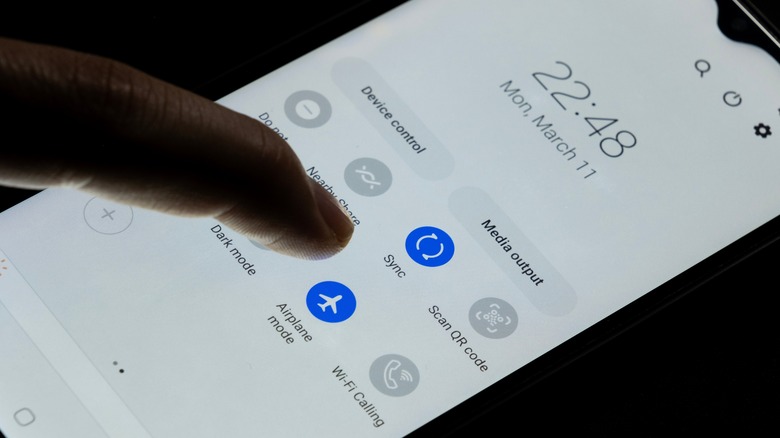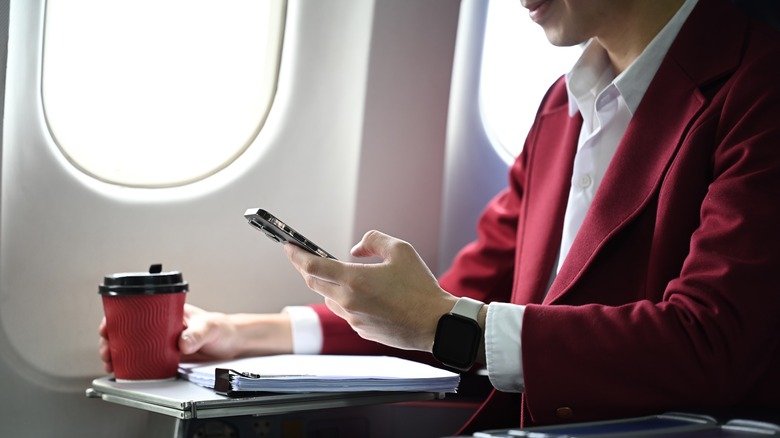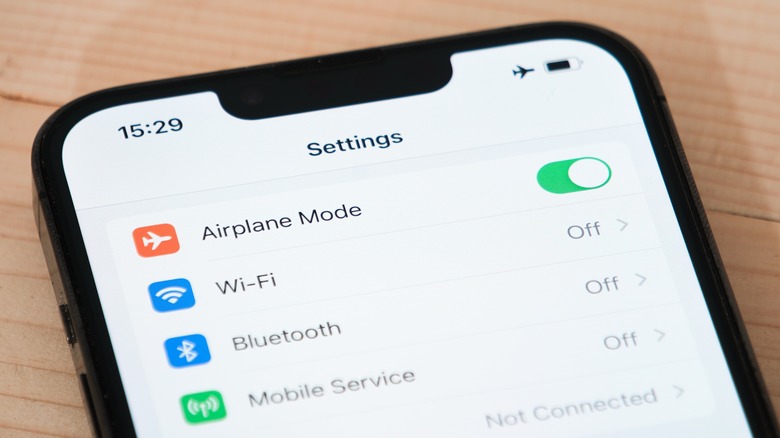Does Airplane Mode Turn Off Your Phone's Location? Here's How It Works
When you board an airplane for a flight, there are a few things that you have to do, some of which you do automatically. You quickly make it to your seat, stash your carry-on luggage in either the overhead compartment or under the seat in front of yours, sit down, and buckle up. You then secure the gadgets you brought with you and make sure you switch them to airplane mode prior to take off when applicable.
Frequent fliers may already have a basic understanding on how this feature works. On a mobile phone, enabling airplane mode immediately switches off all the wireless features on the device to prevent them from potentially interfering with the aircraft's electronic operations. Turning the function on primarily affects the phone's cellular connection — which essentially stops your gadget from sending or receiving voice calls and text messages — as well as its ability to act as a personal hotspot. In some cases, it may also disable Wi-Fi and Bluetooth, but you can turn them back on manually to avail onboard connectivity without exiting airplane mode.
While it's mainly designed for you to activate before taking flight, you don't actually have to be in an airplane to use airplane mode. It can be a quick and easy way to disconnect from the internet or even fix connectivity issues on your mobile device. The question is, does airplane mode conceal your smartphone's location? Most mobile phones don't disable GPS or location services when airplane mode kicks on. To understand the reason behind this, you need to know how GPS works on a mobile device.
What is GPS, and does it get disabled on a mobile phone in airplane mode?
GPS stands for Global Positioning System and consists of several navigation satellites constantly orbiting the Earth. These satellites send out signals, which your mobile phone is designed to listen for and receive. Using these signals, the receiver (aka your phone) calculates its distance from at least four GPS satellites. It is through the distance that your phone is able to determine your actual location.
In this scenario, your mobile device isn't really sending any signals out — it merely deciphers information it receives. Given this function and the fact that the feature was primarily meant for in-flight use, most mobile phones don't disable location services while airplane mode is activated, as it doesn't interfere with the aircraft's systems. Depending on how the information is used, certain mobile apps that utilize your location may continue to work as intended while the device is in airplane mode.
Based on testing, some offline navigation via a map app may work while in airplane mode, provided that you've downloaded the data you want access to in advance. Do note that in order to access real-time navigation in map areas you haven't pre-saved, you'll need cellular or Wi-Fi connectivity. GPS can sometimes be used to locate someone's phone in an emergency capacity. It's important to note though that an unobstructed view of the sky may be required for emergency location services to work.
Can someone track my phone's location while it's in airplane mode?
While it's true that GPS operates independently of other wireless connections on your mobile phone and can be used to track your location in some cases, the general answer to this depends on the situation and the method someone uses to try and locate your mobile device.
For instance, based on testing, while an iPhone is in airplane mode, using Apple's Find My feature via iCloud.com/find won't work and may only indicate the last time it had internet connectivity. However, when an iPhone is marked as lost or when it connects to a Wi-Fi network while it's on airplane mode, it may transmit a location through Find My.
Similarly, Google's Find My Device feature won't be able to detect the location of a mobile device that's been set to airplane mode. However, once it connects to Wi-Fi, even when airplane mode is enabled, the device's location should be detected.


